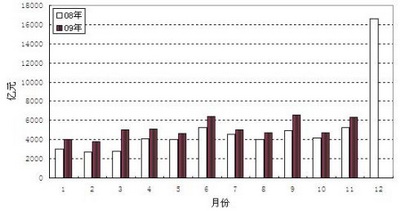

News, page 3, Issue 461, March 21, 2010
Translated by Liu Peng
Original article: [Chinese]
Graph comparing fiscal spending in 2008 and 2009
China's Ministry of Finance (MoF) recently issued a notice to central ministries and commissions as well as local provinces, requiring them to begin reporting spending of any funds allocated to them under the annual fiscal budget on a monthly basis.
The move is aimed at putting an end to the annual spike in government spending that occurs at the end of every year as government department's ensure that they spend all the funds they've been allocated in that year's budget.
According to the notice, as of the beginning of this year, central ministries and commissions along with local governments will be required to fill in a form detailing the monthly outlays of funds included in their annual budgets.
The MoF also emphasized that core ministerial staff must take full responsibility for all departmental budget expenditure.
In addition, the MoF has defined a clear timetable for itself and local financial bureaus detailing at what time they will allocate funds to government organs at the corresponding levels.
Finance departments at all levels will be required to start allocating funds to the various government organs at the corresponding level within 30 days of the corresponding People's Congress approving the budget.
In terms of submitting requests for increasing budgets, the ministry has demanded that all applications should be submitted to it before August 31 and ordered that the ministry should handle all such requests before September 30.
This is not the first time that the Ministry of Finance has attempted to rein in end-of-year spending sprees by central ministries and commissions. For instance, in the past the MoF has required agencies to spend their budget funds in accordance with time requirements; namely, central ministries should spend 25 percent of their own budget funds each quarter, or 8.3 percent of their budget a month.
However, this requirement appears to have been ignored.
From 2006 to 2009, the proportion of the national budget spent in December has been receptively 28.2, 25.1, 27.6 and 26.2 percent of the annual total. There is no obvious trend towards a decline in the proportion of government spending being squeezed into the last month of the year.
The State Forestry Administration (SFA) also serves as another interesting example, the SFA spent 805 million yuan last December, some 19.3 percent of its total budget for the year. Despite the end of year spike in spending, the central government agency was only able to spend 90.3 percent of the funds allocated to it in the 2009 budget.
Reasons for the Surge in Spending
The spike in fiscal spending late in the year has a lot to do with the work pattern of China's government.
Every year, the MoF won't begin to allocate budget funds until the national fiscal budget has been approved by the National People's Congress. As this does not take place until the meeting of the "two sessions" in March every year, so by the these funds arrive at the central ministries and local governments, it's already April or even May.
Another explanation for the spike in spending is that some projects don't require much spending in their early planning stages, but costs shoot up when it comes to the implementation phase, which tends to occur in the second half of year.
According to Dai Bohua, director of the MoF's general office, other unique factors effected fiscal spending in 2009.
Dai argued that due to a sharp decline in fiscal revenues in the first half of the year, the ministry deferred the allocation of some funds to various government organs.
After the fiscal revenue situation began to improve, the MoF began to appropriate the funds that they had withheld, leading to a surge in fiscal spending at the end of the year, Dai added.
According to Dai, the relative regulations also state that budget funds that have not been spent in the previous year, can be carried over to the next year.

